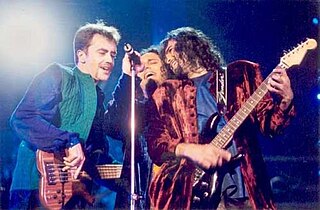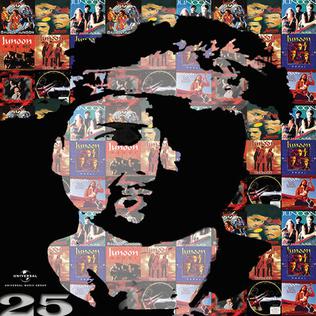
Junoon is a Pakistani sufi rock band from Lahore, Punjab, Pakistan, and Tappan, New York, formed in 1990. The band is directed by founder, lead guitarist and songwriter, Salman Ahmad, who was soon joined by keyboardist Nusrat Hussain, bass guitarist Brian O’Connell and vocalist Ali Azmat. Junoon is Pakistan's and one of South Asia's most successful bands. Since their inception, the group has released a total of nineteen albums: seven studio albums; one soundtrack; two live albums; four video albums; and five compilations. They have sold over 30 million records worldwide.

Ali Azmat Pacha is a Pakistani singer-songwriter, musician and actor. He is best known as the lead singer for the influential Sufi rock band Junoon and for his subsequent solo career later followed by a career as an actor as well.

Junoon is the debut album of the Pakistani sufi rock band Junoon, released on 30 September 1992. It was released by EMI and recorded at the EMI studios in Karachi in 1990. The album is produced by founder, songwriter and lead guitarist Salman Ahmad. The album contained a total track list of twelve songs with eight tracks being in Urdu language, three tracks in English and one instrumental.

Inquilaab is the third studio album and the fourth overall album of the Pakistani band Junoon. Although previous albums by Junoon also achieved considerable success, 'Inquilaab' contained the band's first major hit, the patriotic song "Jazba-e-Junoon". The album also contained the hit "Saeein," which marked Junoon's foray into what later became the sufi rock sound that Junoon is most popularly associated with. Other hits from the album were "Mera Mahi" and "Husan Walo".

Azadi is the fourth studio album and the fifth overall album of the Pakistani sufi rock band, Junoon. The album was released in 1997 and established the Sufi rock sound that the band pioneered on their previous album, Inquilaab. The album was popular worldwide, bringing fame to Junoon.

Ishq is the sixth studio album and the ninth overall album of the Pakistani sufi rock band, Junoon. The album was released on January 1, 2001 and was released by the title of Andaz outside Pakistan.
"Jazba-e-Junoon" is a song by the Pakistani sufi rock band Junoon. It is the thirteenth and final track from the band's album third album, Inquilaab (1996), released on EMI Records. Written by Sabir Zafar and guitarist Salman Ahmad and it is the lead single on the album, the song uses blending of rock guitars and bluesy vocals with eastern elements like the use of tablas, raga-inspired melodies and traditional Pakistani folk music.

United For Peace is the second video album and the tenth overall album by the Pakistani band, Junoon. The album contains four music videos from Junoon's previous albums, which include Azadi, theme from Jinnah the Movie, Bulleya from Parvaaz, Jazba-e-Junoon from Inquilaab, and Zamane Ke Andaz from Andaz.

Dewaar: The Best of Junoon is the third compilation album and the fourteenth overall album released by Pakistani rock band, Junoon. The album is produced by the band vocalist and lead guitarist, Salman Ahmad.
Inquilaab – The Story of Junoon is a 44-minute radio broadcast documentary presented by Omar Bilal Akhtar, broadcast on City FM 89, on March 13, 2009. The documentary explores the journey of the South Asian rock music band Junoon and the struggle they face to become one of the biggest band in the world.
"Talaash" is a song by the Pakistani sufi rock band Junoon. It is the seventh track and the only single released from the band's second album, Talaash (1993), released on EMI Records. Written by guitarist Salman Ahmad, it is the lead single on the album. The song uses blending of rock guitars and bluesy vocals with eastern elements like the use of tablas. It remains one of the band's most popular songs. In addition, the album version of the song featured in the compilation album, Kashmakash, released in 1995.
Heer" is an instrumental song by the Pakistani sufi rock band Junoon. The instrumental was first released on the band's self-titled debut album, Junoon released in 1991 and later in the fourth studio album, Azadi released in 1997. The instrumental is composed by the band's lead guitarist Salman Ahmad. The instrumental uses blending of rock guitars and bluesy vocals with eastern elements like the use of tablas, raga-inspired melodies and traditional Pakistani folk music.
"Saeein" is a song by Pakistani sufi rock band Junoon. It is Junoon's eleventh single and the second from the 1996 studio album Inquilaab. The song is written by lead guitarist, Salman Ahmad and lyricist, Sabir Zafar. Due to the song's popularity, it also featured on the band's fourth studio album Azadi released in 1997. "Saeein" is one of Junoon's most popular songs, and has been covered numerous times, most notably by Indian singer Harshdeep Kaur. The song marked Junoon's foray into what later became the sufi rock sound that the band is most popularly associated with. The song uses blending rock guitars and bluesy vocals with eastern elements like the use of tablas, raga-inspired melodies, traditional Pakistani folk music, and Eastern inspired poetry.
"Meri Awaz Suno" is a song by the Pakistani sufi rock band Junoon, released in 1995. It is the second track from the band's fourth album, Azadi (1997), released on EMI Records. The song was written by lead guitarist Salman Ahmad and writer Sabir Zafar. It remains one of the band's most popular songs.
Sayonee is a song by the Pakistani sufi rock band Junoon, released in April, 1997. It is the first track from the band's fourth album, Azadi (1997), released on EMI Records. Written by lead guitarist and founder of the band Salman Ahmad and writer Sabir Zafar, it is the lead single on the album, the song uses blends of rock guitars and bluesy vocals with traditional musical elements like the tabla percussion drums, Hindustani raga-inspired melodies styled and blended into Pakistani folk music.
"Yaar Bina" is a song by the Pakistani sufi rock band Junoon, released in April, 1997. It is the fourth track from the band's album fourth album, Azadi (1997), released on EMI Records. Written by lead guitarist and founder of the band Salman Ahmad and writer Sabir Zafar, it is one of the lead single's on the album, the other being "Sayonee", the song uses blending of rock guitars and bluesy vocals with eastern elements like the use of tablas, raga-inspired melodies and traditional Pakistani folk music.

Talaash is the second studio album of the Pakistani sufi rock band Junoon, released on September 3, 1993. The album was to be their first with bassist Brian O'Connell, who joined the band after Nusrat Hussain departed from the band to pursue his career as a solo artist and released his debut album Amrit in 1992. This was also the first Junoon album produced by Salman Ahmad and O'Connell, both also went on releasing several other albums by Junoon before O'Connell left the band after Dewaar in 2003. The album also served as a soundtrack for the Pakistani television show Talaash, which featured the band and its novel storyline was based on the band.

Door is the ninth studio album and twentieth overall album by the Pakistani rock band Junoon. It was released on 26 December 2016 by Universal Music in Pakistan and India. It is the second Junoon album led by guitarist and singer Salman Ahmad following Ali Azmat's departure in 2005 and a tribute album following the death of former Vital Signs vocalist Junaid Jamshed in plane crash on 07th December 2016, to whom "Khwab" and "Door Bohat Door" are dedicated.










